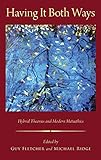Having it both ways [Book] : hybrid theories and modern metaethics / edited by Guy Fletcher, Michael Ridge.
Material type: TextSeries: Oxford moral theoryDescription: xvi, 302 pages : illustrations ; 24 cmISBN:
TextSeries: Oxford moral theoryDescription: xvi, 302 pages : illustrations ; 24 cmISBN: - 9780199347582 (hardback)
- 170.42 23
- 170.42
| Item type | Current library | Call number | Status | Date due | Barcode | Item holds |
|---|---|---|---|---|---|---|
 Books
Books
|
Junaid Zaidi Library, COMSATS University Islamabad 2nd Floor | 170.42 FLE-H (Browse shelf(Opens below)) | Available | 59123 | ||
 Books
Books
|
Junaid Zaidi Library, COMSATS University Islamabad 2nd Floor | 170 TAR-P (Browse shelf(Opens below)) | Available | 59125 |
Uk
A recent trend in metaethics has been to reject the apparent choice between pure cognitivism, where moral (and other normative) judgments are understood as representational or belief-like states, and pure non-cognitivism, where they are understood as non-representational or desire-like states. Rather, philosophers have adopted views which seek in some way to combine the strengths of each side while avoiding the standard problems for each. Some such views claim that moral judgments are complexes of belief-like and desire-like components. Other views claim that normative language serves both to ascribe properties and to express desire-like attitudes. This collection of twelve new essays examines the prospects for such 'hybrid views' of normative thought and language. The papers, which focus mainly on moral thought and talk, provide a guide to this debate while also pushing it forward along numerous fronts.
All.
All.


There are no comments on this title.